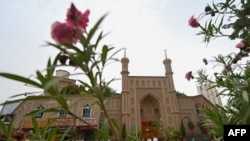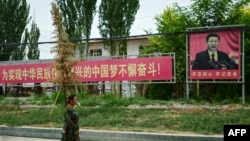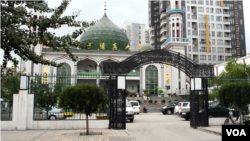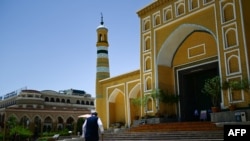A new report finds that authorities in China are reducing the number of mosques in areas with large Muslim populations. Analysts and activists say the campaign aims to restrict the practice and presence of Islam there while strengthening the government’s control over religious minorities.
The report, released by Human Rights Watch on November 22, said the Chinese government has been systematically demolishing, converting, or closing down mosques across China under a campaign of “mosque consolidation” in recent years. In some cases, local authorities remove Islamic architectural features, such as domes or minarets, or demolish structures like ablution halls that are used for cleansing purposes.
“The Chinese government is not "consolidating" mosques as it claims, but closing many down,” Maya Wang, the acting China director at HRW, told VOA by phone. In her view, the demolition or repurposing of mosques in China is part of Beijing’s effort to reduce Islam’s presence in China and curb people’s participation in the religion.
“It’s not just about cosmetic changes to the mosques. It’s an overarching objective to reduce Muslims’ ability to freely practice Islam,” Wang added.
Despite concerns about the possible erasure of Islam in China, the Chinese Embassy in Washington said the government in Beijing “protects citizens’ freedom of religious belief in accordance with the law.”
“Muslims from various ethnic groups are free to practice their belief in mosques and at home according to religious doctrines, rules and traditional customs,” said embassy spokesperson, Liu Pengyu, adding that relevant parties should “respect facts, abandon prejudice and stop groundless hyping.”
According to copies of Chinese government documents, media reports, and academic studies, HRW said the campaign to repurpose mosques across China originates from Chinese leader Xi Jinping’s call in 2016 to “sinicize Islam,” a campaign that has strengthened the government’s control over religion. The term “sinicize” refers to efforts to bring something under Chinese influence.
During a visit to Xinjiang in August, Xi said the Chinese government should deepen the efforts to facilitate the“sinicization of Islam” in the region and effectively manage different kinds of “illegal religious activities.”
Xinjiang is an autonomous region in northwestern China that has seen large-scale internment and persecution of Uyghurs and other Turkic Muslim minorities, according to a study by the Australian Strategic Policy Institute. Rights groups say more than one million Uyghurs and other Muslim minorities have been held in “re-education camps there.” Beijing denies the accusations.
In May, Wang Huning, a top political advisor to Xi, called on leaders of the China Islamic Association to “further promote the localization of Islam in China” and cultivate a “growing sense of identity” with the “motherland.”
On the Chinese social media platform Weibo, some posts highlight the “long history” of Islam integrating with Chinese culture, which is rooted in Confucianism.
Implementing the Islam sinicization campaign across China
As part of the campaign to “sinicize Islam,” “mosque consolidation” aims at making Islamic religious venues “more Chinese” while hoping to “compress the overall number of mosques,” according to a Chinese Communist Party document cited by the report. The document states that “there should not be newly built Islamic venues” and while there can be exceptions, “there should be more [mosque] demolitions than constructions.”
Efforts to “consolidate” mosques in Ningxia and Gansu started after Chinese authorities demolished or destroyed about two-thirds of mosques in Xinjiang.
The report from Human Rights Watch found that among seven mosques in two villages In Ningxia, four suffered serious damage, including the demolition of their main buildings or interior damage to ablution halls. In addition, local authorities removed the domes and minarets of all seven mosques. Ningxia has one of the largest Muslim populations in China after Xinjiang.
Some media reports estimate that some 400 to 500 mosques in Ningxia, which had about 4,200 mosques in 2014, have been closed down in recent years. A study conducted by two experts, Hannah Theaker at the University of Plymouth and David Stroup at the University of Manchester, suggests that at least one-third of Ningxia’s mosques have been closed since 2020.
By reviewing videos and images shared by Hui Muslims on social media platforms and corroborating satellite images, Human Rights Watch found that in Ningxia’s Muslim-majority Liaoqiao village, the Islamic architectural features in three mosques, including minarets and round domes, were removed between January and August 2020 and the main halls of three other mosques were destroyed.
Stroup from the University of Manchester in Britain told VOA by phone that the campaign to “sinicize Islam” has been rolled out gradually across China and the degrees of impact on local communities in different areas vary.
“In Ningxia or southern Gansu, we have seen a lot of large-scale transformations of communities, including the renovation of mosques, the closing of mosques, and the merger of mosques without considering sectarian differences between different communities,” he said.
Overall, Stroup said he thinks the Chinese government’s efforts to sinicize Islam reflect its intention to implement the campaign across China. “The campaign is comprehensive and it intends to reach nationwide implementation,” he told VOA.
While Chinese authorities often frame the campaign as a policy to “reduce the economic burden” on Muslim communities in rural areas, these efforts have faced sporadic resistance from members of the local community, including clashes between local residents and police.
While resistance may have been small-scale, Stroup said people still try to express their dissatisfaction in limited ways. “There are opportunities for people to express agency, but the state does have the overwhelming preponderance of force in this issue,” he said.
Strengthening government control over the practice of Islam
Apart from “mosque consolidation,” some activists say Beijing is also trying to transform Muslims and ultimately redirect their loyalty to the Chinese Communist Party. “The Chinese government isn’t simply repurposing the appearance of mosques, but they are systematically taking control of mosques across the country,” Ma Ju, a U.S.-based Hui Muslim activist, told VOA by phone.
According to Ma, local authorities not only remove Muslim communities’ cultural traits from mosques but impose strict control over who is allowed to enter them. “Muslim children have been banned from entering mosques and this move deprives them the opportunity to receive religious and cultural education like previous generations,” he said.
To strengthen their control over mosques, Ma said local authorities use different techniques, such as checking attendees’ identification cards or installing surveillance cameras, to help them monitor and surveil local residents.
“In many Muslim regions, the Chinese government has implemented a rule of reducing the number of mosques, which makes going to mosques more difficult for local residents and eventually may lead to the erasure of Islam in China,” he told VOA.
Stroup said one of the goals Beijing hopes to achieve through the efforts to sinicize Islam is to “re-center” Islamic practice and expression on a set of cultural and ideological values that the authorities approve.
“Things that are seen as foreign are labeled as potentially vulnerable to extremism [by the authorities] and the intention of sinicization is to align the values of Islam with the values of the Chinese party state,” he said.
Some information for this report provided by Agence France-Presse.








